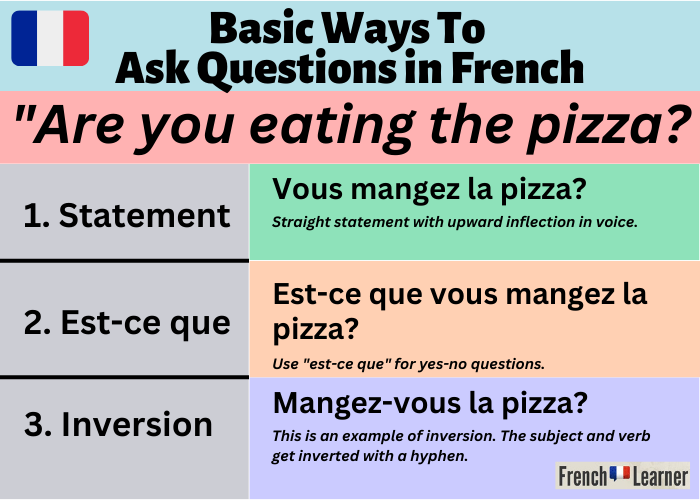One of the most basic ways to ask questions in French is to use the word est-ce que. For example, Est-ce que vous parlez français? (Do you speak French?) That said, the rules for asking questions are very complex. In this post we’ll explain precisely how ask questions in French and provide lots of example sentences with audio.

Asking questions in French – the basics

Asking questions in French in a nutshell
The following is a snap shot for the three main ways of asking questions. We’ll get into much more detail below.
Statement question
Vous mangez la pizza?
Are you eating the pizza?
Using est-ce que
Est-ce que vous mangez la pizza?
Are you eating the pizza?
Inversion
Mangez-vous la pizza?
Are you eating the pizza?
Statement questions
The most basic for of asking a yes-no question is simply to make a statement with a rising tone towards the end. Here are some examples:
Vous mangez?
Are you eating?
Questions with est-ce que
Another way to ask a yes-no question is to put the word est-ce que before the statement. The literal translation of est-ce que (pronounced ehs-kuh) is “is this that”. However, est-ce que can translate to is, are do and does for yes-no questions.
Here are the same example questions listed above using est-ce que:
Est-ce que vous mangez?
Are you eating?
Est-ce que becomes est-ce qu’ before il, elle, ils and elles (he, she and them). The pronunciation of qu’il is [keel] and the pronunciation of qu’elle is [kell].
- Est-ce qu’il parle français? Does he speak French?
- Est-ce qu’elle voyage? Is she traveling?
Inversion method
The third most common way to ask a question is to use the inversion method. Reverse the order of the subject and verb and connect them with a hyphen. Here are the same questions using inversion:
Mangez-vous?
Are you eating?
For verbs ending in vowels in the third-person singular form (il, elle), a -t must be inserted to create a liaison.
Mange-t-il? Voyage-t-elle?
Is he eating? Is she traveling?
For the verbs aller (to go) and avoir (to have), a -t is added when doing inversion on the third-person singular form.
Va-t-il en France?
Is he going to France?
A-t-elle la voiture?
Does she have the car?
Ways of asking “what”
One of the translations of the commonly used French words que is “what”. When preceding est-ce que, qu’est-ce que translates to “what”. For example:
Qu’est-ce que vous mangez?
What are you eating?
These questions can also be asked with que and inversion:
Que mangez-vous?
What are you eating?
Information seeking questions
To ask an information-seeking question, such as who, what, where, when and why, put the information seeking word before est-ce que.
Information seeking words including qui (who; more on qui below), que (what), où (where), quand (when), pourquoi (why) and comment (how). A quelle heure (at what time) can also be included here.
Here are some example sentences using both est-ce que and inversion.
Pourquoi est-ce que vous mangez?
Why are you eating?
Où est-ce que vous mangez?
Where are you eating?
Où mangez-vous?
Where are you eating?
A quelle heure/quand mangez-vous?
When are you eating?
Pourquoi mangez-vous?
Why are you eating?
Question tags
Tags can be inserted on the end of questions. There are words like “right?” and “isn’t that so” in English. Here are some examples:
Vous parlez francais, n’est-ce pas?
You speak French, right?
Elle est belle, non?
She’s pretty, isn’t she?
Il joue bien, pas vrai?
He plays well, right?
More advanced ways of asking questions
This section will cover some more advanced ways of asking questions. This topic is covered wonderfully in Chapter 7 of the book Practice Makes Perfect: Complete French All-in-One.
Questions with qui (who)
Questions relating to the word qui (who) can be a bit tricky. We’ve covered this topic in detail on this page: Who in French. Here are some quick example sentences:
Qui parle français?
Who speaks French?
Where are other ways to ask “who” questions:
- Qui est-ce que vous aimez? Who do you like?
- Qui est-ce qui parle francais? Who speaks French?
- Qui est-ce que vous aimez? Who do you like?
Questions with which/what
To asking which/what questions, use the word quel. We cover this topic in detail on this page: French interrogative adjectives and pronouns.
Quel has four forms depending on gender and number of the noun in question. Here are some examples:
Quel jour est-ce que vous arrivez?
Which day are you arriving?
Here are “which” questions using the other forms:
- Quelle voiture est-ce que vous aimez? Which car do you like?
- Quels chiens est-ce que vous préférez? Which dogs do you prefer?
- Quelles langues est-ce que vous parlez? Which languages do you speak?

Advanced questions with qu’est-ce que
Questions which with qu’est-ce que (what) can be come tricky. Here’s the rule: qu’est-ce qui + verb or qu’est-ce que + personal pronoun. For example:
Qu’est-ce qui se passe?
What’s happening?
Qu’est-ce que vous faites?
What are you doing?
Questions with peoples names
Asking questions with peoples’ names requires a specific grammatical structure: Person’s name + inverted verb and personal pronoun + object. Here’s an example:
Pascal aime-t-il le fromage?
Does Pascal like the cheese?
More examples:
- Marie joue-t-elle de la guitare? Does Marie play the guitar?
- Les français sont-ils arrogants? Are French people arrogant?
Questions with nouns
For questions with nouns, use the following construction: Noun + inverted pronoun + verb + adjective or adverb. Here are some examples.
Le magasin est-il ouvert?
Is the store open?
More examples:
- La pizza est-elle délicieuse? Is the pizza delicous?
- La fille court-elle vite? Does the the girl run fast?
Conclusion: asking questions in French
Félicitations! Congratulations! You now know how to ask questions in French! Est-ce que vous avez compris la leçon? Did you understand the lesson? Now check our post covering five key rules for French sentence structure!



